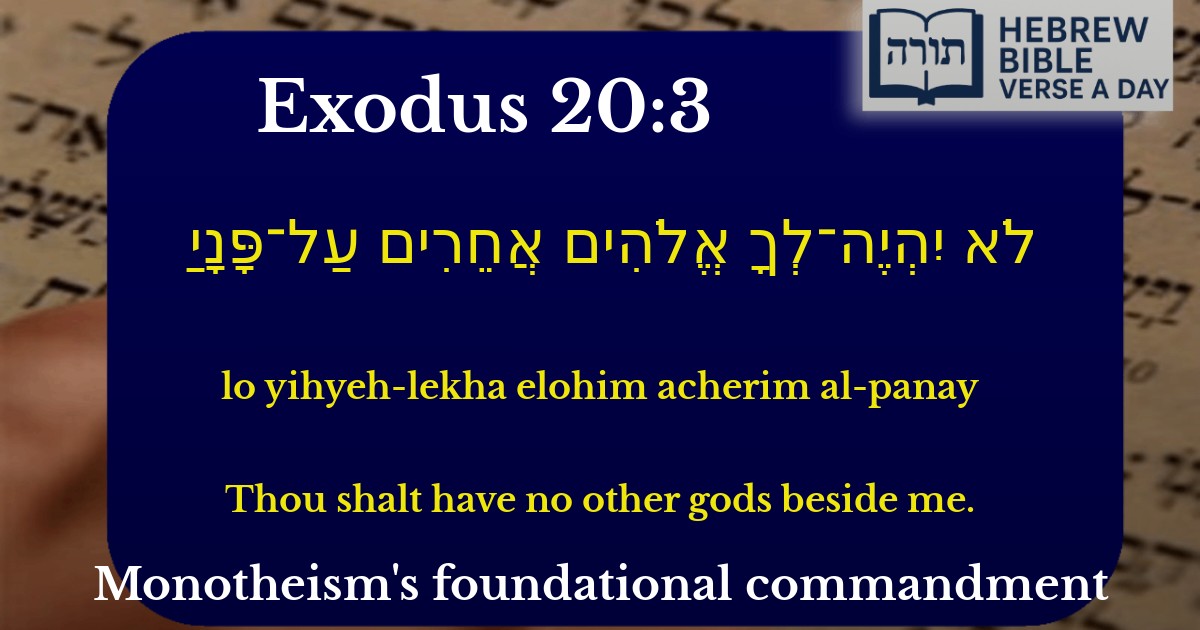Join Our Newsletter To Be Informed When New Videos Are Posted
Join the thousands of fellow Studends who rely on our videos to learn how to read the bible in Hebrew for free!
Hebrew Text
לֹא יִהְיֶה־לְךָ אֱלֹהִים אֲחֵרִים עַל־פָּנָיַ
English Translation
Thou shalt have no other gods beside me.
Transliteration
Lo yihyeh-lekha elohim acherim al-panay
Hebrew Leining Text
לֹֽ֣א־יִהְיֶ֥͏ֽה־לְךָ֛֩ אֱלֹהִ֥֨ים אֲחֵרִ֖֜ים עַל־פָּנָֽ͏ַ֗י׃
לֹֽ֣א־יִהְיֶ֥͏ֽה־לְךָ֛֩ אֱלֹהִ֥֨ים אֲחֵרִ֖֜ים עַל־פָּנָֽ͏ַ֗י׃
🎵 Listen to leining
Parasha Commentary
📚 Talmud Citations
This verse is quoted in the Talmud.
📖 Sanhedrin 56a
The verse is cited in the discussion of the Noachide laws, specifically regarding the prohibition of idolatry.
📖 Makkot 23b
The verse is mentioned in the context of enumerating the 613 commandments, where it is identified as the first of the Ten Commandments.
📖 Avodah Zarah 54b
The verse is referenced in discussions about the nature of idolatry and the prohibition against worshiping other gods.


The Prohibition of Avodah Zarah (Idolatry)
The verse "לֹא יִהְיֶה־לְךָ אֱלֹהִים אֲחֵרִים עַל־פָּנָיַ" (Exodus 20:3) is the first of the Ten Commandments and establishes the foundational principle of monotheism in Judaism. Rashi explains that the phrase "עַל־פָּנָיַ" ("beside Me") means "in My presence" or "as long as I exist," emphasizing that any form of idolatry is an affront to Hashem's sovereignty.
Rambam's Explanation in Mishneh Torah
In Hilchot Avodah Zarah (Laws of Idolatry 2:1), the Rambam (Maimonides) elaborates that this prohibition includes not only worshipping other deities but also attributing any form of divinity to intermediaries, such as angels or celestial bodies. The Rambam emphasizes that Hashem alone is the sole Creator and Sustainer of the universe, and any belief in other powers denies this fundamental truth.
Midrashic Interpretations
The Mechilta (a halachic Midrash on Exodus) teaches that this commandment is phrased in the singular ("לְךָ" – "to you") to underscore that each individual bears personal responsibility to reject idolatry. The Midrash further states that accepting Hashem's kingship is the prerequisite for all other mitzvot.
Talmudic Perspectives
The Concept of "Al Panai" (Before Me)
Ibn Ezra interprets "עַל־פָּנָיַ" as meaning "in addition to Me," teaching that one cannot serve Hashem while also acknowledging other deities. The Sforno adds that idolatry is particularly grievous because it replaces the true Source of existence with falsehood.
Practical Implications in Halacha
Shulchan Aruch (Yoreh De'ah 146) rules that any act associated with idol worship—including making, benefiting from, or even discussing its practices—is forbidden. This extends to modern forms of avodah zarah, such as attributing power to materialism or false ideologies.